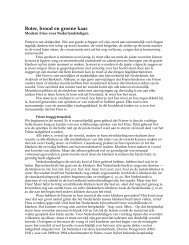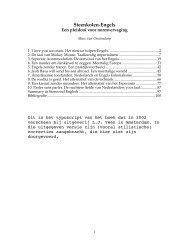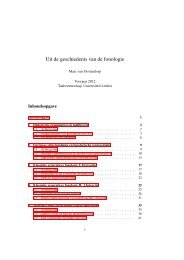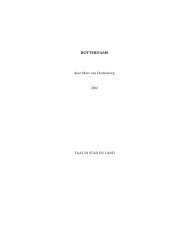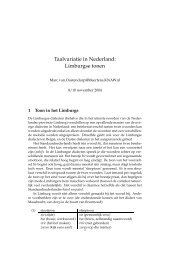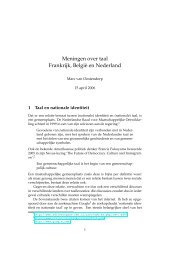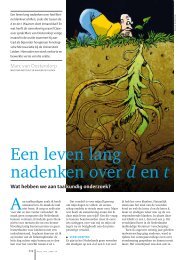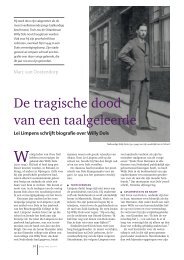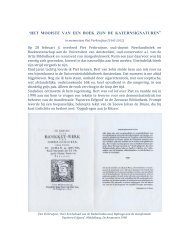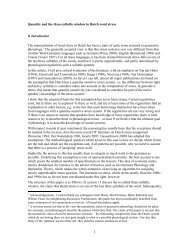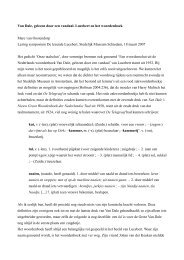Taalvariatie en taalbeleid - Marc van Oostendorp
Taalvariatie en taalbeleid - Marc van Oostendorp
Taalvariatie en taalbeleid - Marc van Oostendorp
You also want an ePaper? Increase the reach of your titles
YUMPU automatically turns print PDFs into web optimized ePapers that Google loves.
Engels te sprek<strong>en</strong> (ongeveer 80% <strong>van</strong> de bevolking verklaarde e<strong>en</strong> gesprek in die<br />
taal te kunn<strong>en</strong> voer<strong>en</strong>)<br />
• Conclusie: de relatie tuss<strong>en</strong> taal <strong>en</strong> nationale id<strong>en</strong>titeit is in Nederland e<strong>en</strong><br />
andere dan in sommige andere land<strong>en</strong>. M<strong>en</strong> is <strong>en</strong>erzijds vrij gemakkelijk bereid<br />
die taal op te gev<strong>en</strong>, maar wil haar tegelijk ook puur houd<strong>en</strong>.<br />
• De Nederlandse Taalunie. Sinds 1980 werk<strong>en</strong> de Nederlandse <strong>en</strong> Vlaamse (vroeger:<br />
Belgische) overheid sam<strong>en</strong> in de Nederlandse Taalunie. Al het beleid <strong>van</strong> beide<br />
regering<strong>en</strong> op het gebied <strong>van</strong> taal <strong>en</strong> literatuur (spellingsregeling, uitreiking<br />
staatsprijz<strong>en</strong>, ondersteuning lerar<strong>en</strong> Nederlands in het buit<strong>en</strong>land) wordt door de<br />
NTu uitgevoerd. De instelling is gevestigd in D<strong>en</strong> Haag. Vlaamse <strong>en</strong> Nederlandse<br />
<strong>taalbeleid</strong>sgedacht<strong>en</strong> kom<strong>en</strong> er sam<strong>en</strong>. Interessant is dat de oorspronkelijke<br />
doelstelling<strong>en</strong> <strong>van</strong> de oprichters sterk op het versterk<strong>en</strong> <strong>van</strong> de e<strong>en</strong>heidstaal gericht<br />
war<strong>en</strong> (e<strong>en</strong> 'Belgische' doelstelling), maar dat de aandacht de laatste tijd iets komt te<br />
verligg<strong>en</strong> naar taalvariatie (e<strong>en</strong> 'Nederlandse' gedachte).<br />
2. De erk<strong>en</strong>ning <strong>van</strong> streektal<strong>en</strong><br />
Achtergrond. In 1992 tek<strong>en</strong>de de Nederlandse regering het Europees Handvest voor<br />
Regionale Tal<strong>en</strong> of Tal<strong>en</strong> <strong>van</strong> Minderhed<strong>en</strong>; dit werd in 1996 geratificeerd door het<br />
parlem<strong>en</strong>t. In eerste instantie was het bedoeld voor de erk<strong>en</strong>ning <strong>van</strong> het Fries, maar al<br />
snel volgd<strong>en</strong> Nedersaksisch <strong>en</strong> Limburgs. De regering heeft nu nog e<strong>en</strong> aanvraag voor<br />
erk<strong>en</strong>ning <strong>van</strong> het Zeeuws in behandeling.<br />
(1) (Europees Handvest)<br />
For the purposes of this Charter:<br />
a. "regional or minority languages" means languages that are:<br />
i. traditionally used within a giv<strong>en</strong> territory of a State by nationals of<br />
that State who form a group numerically smaller than the rest of<br />
the State's population; and<br />
ii. differ<strong>en</strong>t from the official language(s) of that State;<br />
it does not include either dialects of the official language(s) of the State or<br />
the languages of migrants;<br />
(…)<br />
c. "territory in which the regional or minority language is used" means the<br />
geographical area in which the said language is the mode of expression of<br />
a number of people justifying the adoption of the various protective and<br />
promotional measures provided for in this Charter;<br />
d. "non-territorial languages" means languages used by nationals of the State<br />
which differ from the language or languages used by the rest of the State's<br />
population but which, although traditionally used within the territory of<br />
the State, cannot be id<strong>en</strong>tified with a particular area thereof.<br />
(2) (Memorandum <strong>van</strong> toelichting)<br />
Differ<strong>en</strong>t languages:<br />
32. These languages must clearly differ from the other language or languages<br />
spok<strong>en</strong> by the remainder of the population of the state. The charter does not<br />
concern local variants or differ<strong>en</strong>t dialects of one and the same language.<br />
However, it does not pronounce on the oft<strong>en</strong> disputed question of the point at<br />
which differ<strong>en</strong>t forms of expression constitute separate languages. This question<br />
dep<strong>en</strong>ds not only on strictly linguistic considerations, but also on psychosociological<br />
and political ph<strong>en</strong>om<strong>en</strong>a which may produce a differ<strong>en</strong>t answer in<br />
each case. Accordingly, it will be left to the authorities concerned within each<br />
state, in accordance with its own democratic processes, to determine at what<br />
point a form of expression constitutes a separate language.<br />
2




